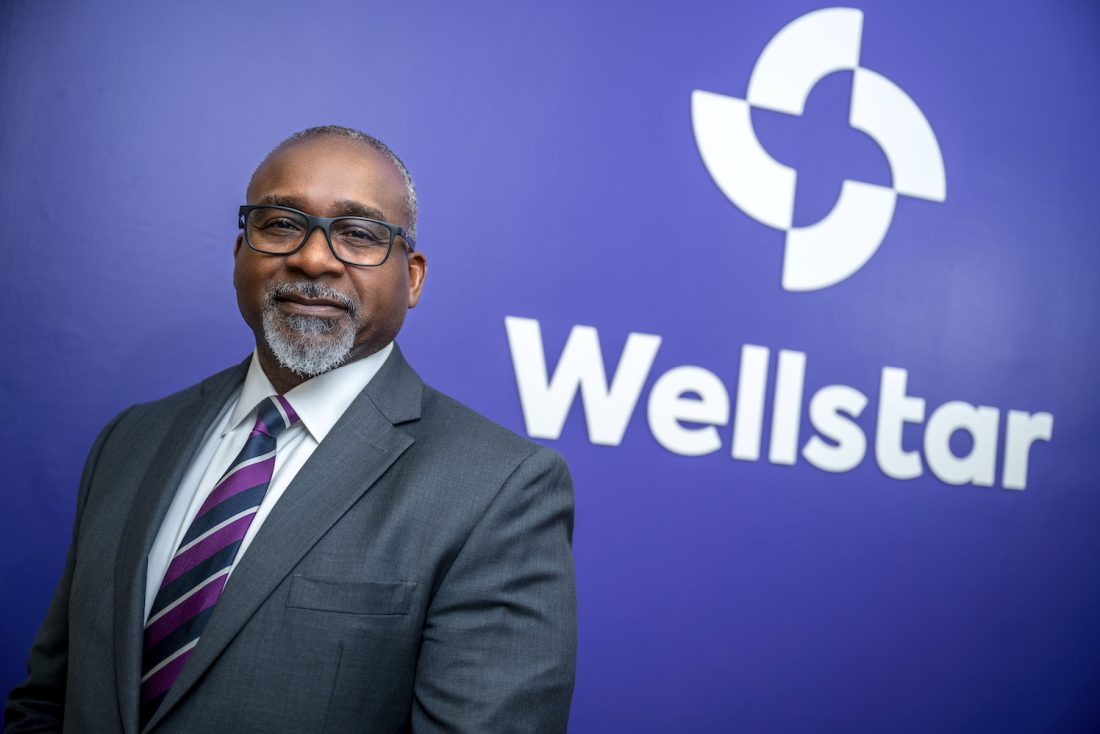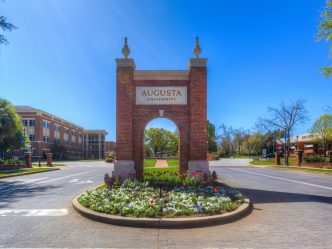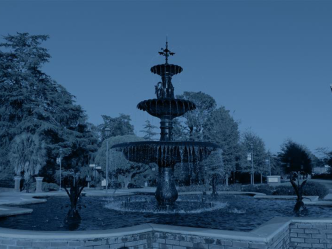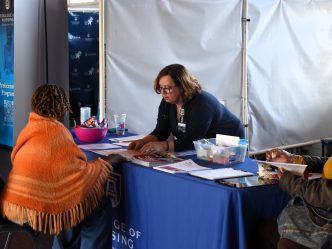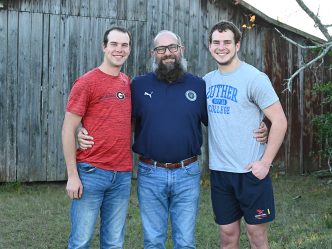After spending more than 20 years proudly serving in the U.S. Army, Ralph D. Turner, DBA, has gone on to build a rewarding career in health care that has taken him around the world.
But success was far from a guarantee in life for Turner, who currently serves as president of Wellstar MCG Health Medical Center. He knows a thing or two about hard work.
Born in the small town of Hahira, Georgia, Turner grew up raised by three strong women.
“My father passed away when I was 4, so I was raised by my mother, my grandmother and my godmother,” said Turner, who will be the keynote speaker at Augusta University’s Graduate Hooding and Commencement Ceremony at 6 p.m. Wednesday, Dec. 11, in the Augusta Marriott at the Convention Center. “Those three women taught me about treating people the way I want to be treated because if I didn’t, they pretty much reminded me and didn’t allow me to forget. But it was a lesson well instilled in me, and that’s my leadership philosophy today.”
“If you care for your people, then your people will care for your patients. That’s the basis of my servant leadership philosophy – take care of our people by ensuring they have what they need to do their job.”
Ralph D. Turner, DBA, president of Wellstar MCG Health Medical Center
In fact, when Turner interviewed for his position with Wellstar, he saw that philosophy reflected throughout the company.
“Everyone I interviewed with talked about the same thing: the culture and care for our people,” he said. “If you care for your people, then your people will care for your patients. That’s the basis of my servant leadership philosophy – take care of our people by ensuring they have what they need to do their job.”
The ‘why’ factor
When asked what advice he would offer to graduates of Augusta University, Turner smiled and admitted that was not an easy answer.
“One of the things I always say is, ‘Figure out the why,’” Turner said, adding that graduates are coming to the end of a challenging chapter in their lives. “Clearly, they figured out their ‘why’ to get through school because when they were sitting there studying at 2 a.m. or 3 a.m., they were thinking, ‘Man, why am I doing this?’ But they did it to get through college. Now, they have to figure out their ‘why’ for life.”
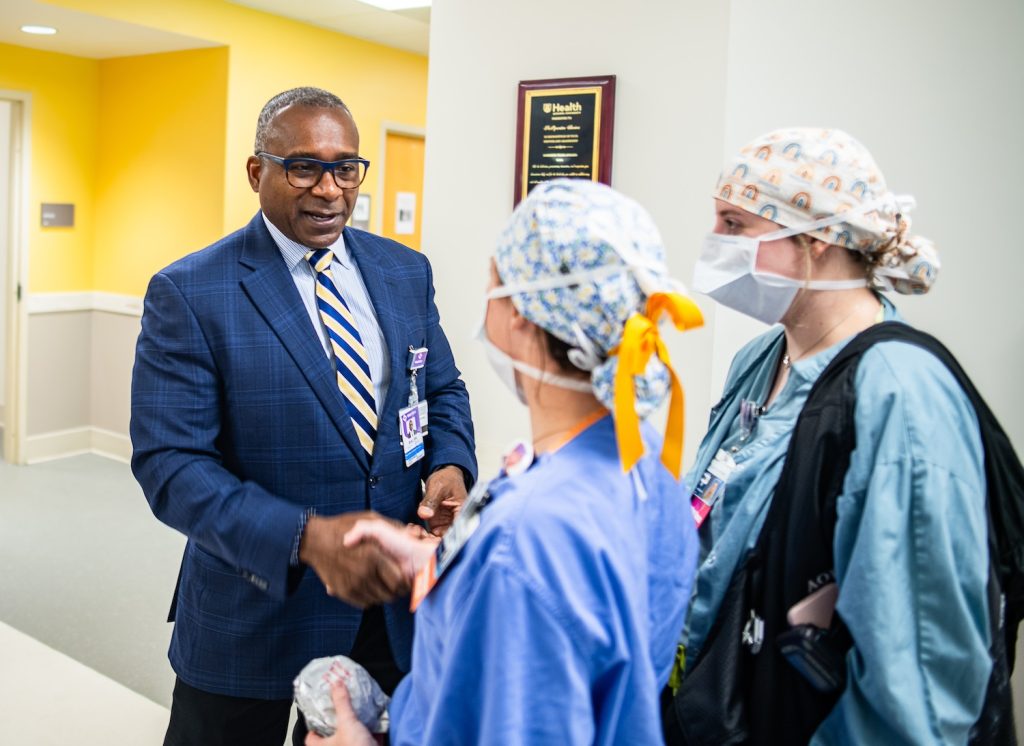
That “why” will bring their future into focus, Turner said.
“There is this old adage, ‘If you do what you love, you’ll never work a day in your life,’” Turner said, chuckling. “Well, sometimes you can’t always do what you love. You have got to do what you’ve got to do to survive. You do what you have to, so later on in life, you can do what you want to. So, when you are doing what you have to, you’ve got to remember your why.”
“My best advice to recent college graduates: Figure out your why. The rest will fall into place.”
Ralph D. Turner, DBA, president of Wellstar MCG Health Medical Center
Turner said he frequently focused on his “why” when tested in the Army.
“I’ve been in many positions in the Army where I was thinking, ‘OK, it’s 4 a.m., my face is down in the mud. Why am I doing this?’” Turner said. “My answer was always to be there for my mom. I just had a fear of her calling me, asking me to help her with something and me not being able to provide.”
“That always stayed with me,” he added. “I told myself, ‘Don’t ever be in a position where if she called me, I could not help.’ So, I always kept going one step further. The older she became, the more help she would need. So, I had to make sure that I was able to help.”
Turner’s mother, who recently passed away, worked two jobs most of her life to support her family.
“I grew up in a poverty state,” Turner said. “I didn’t know it because my mom worked so hard to where I didn’t want for anything. Even when I went to work in high school, she always made sure I had what I needed.”
Never give up
The family was constantly facing challenges, but Turner’s mother never gave up.
“When I was younger in middle school, our house got foreclosed. We had to move to a couple of different homes because my mom had a hard time paying rent,” he said. “She married a guy who was not supportive. She adopted his three daughters. So, it was me and three other girls that she took in as her own. He was busy running the streets, and she was busy working two jobs to keep a roof over our heads.”
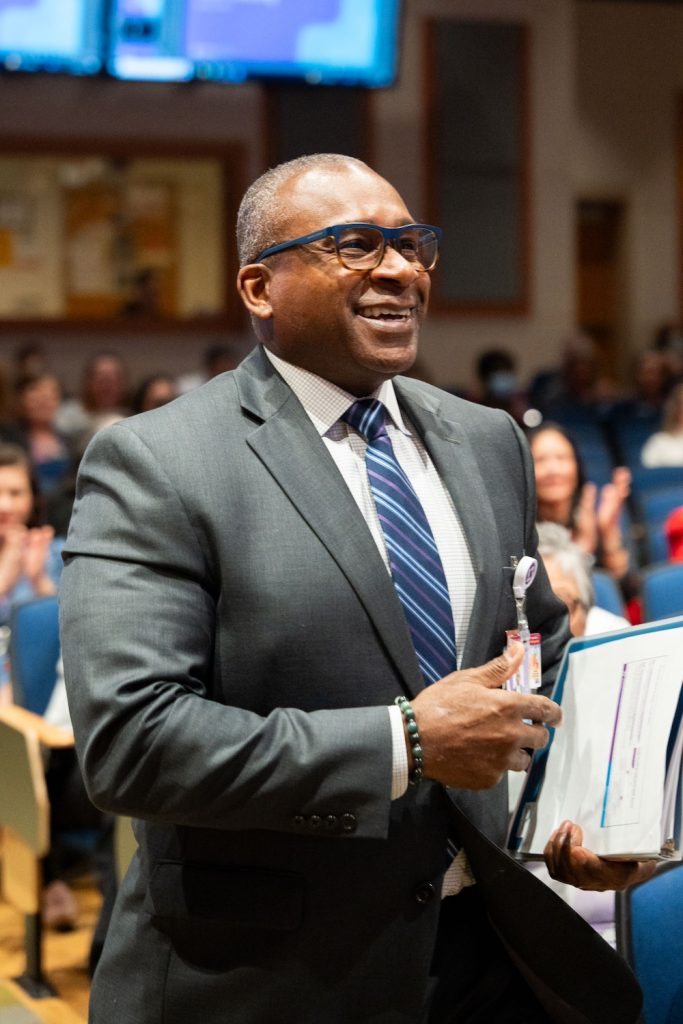
One night, his mother was working as a short-order cook at a local diner when the mayor came in for an early morning breakfast. She told the mayor she needed a house, and he called the city’s Department of Housing and Urban Development and told the director to find a home for the family.
“She paid maybe $90 a month for rent, but it was a three-bedroom house with one bathroom,” Turner said. “She took care of us. I later bought her that house before she passed away. She had lived in that same house for so many years; she didn’t want to move out of it. So, I asked the city to allow me to buy it, and I bought it for her because I never wanted her to lose her home again.”
“I’m not the traditional student. I didn’t graduate high school and go to college for four years. Every bit of education I received – my bachelor’s, two master’s and a doctorate – has always been while working full time.”
Ralph D. Turner, DBA, president of Wellstar MCG Health Medical Center
Making sure his mother was always taken care of was Turner’s “why,” he said.
“Watching her work, watching her take care of kids who weren’t hers, taking care of me and never complaining, that was the lesson I always took from her,” he shared. “That’s where my love for her developed into saying, ‘If she ever needs anything, I’m always going to be there for her,’ because she deserved to have at least one good man in her life and let that be me.”
Turning toward health care
Turner’s compassion is what helped lead him into health care management. That and his fear of snakes, he joked.
“I went into the military for the opportunity,” he said. “I graduated from high school in Valdosta a quarter early, so I went down to Florida to live with my aunt and uncle in Miami who helped me find work in a foundry.”
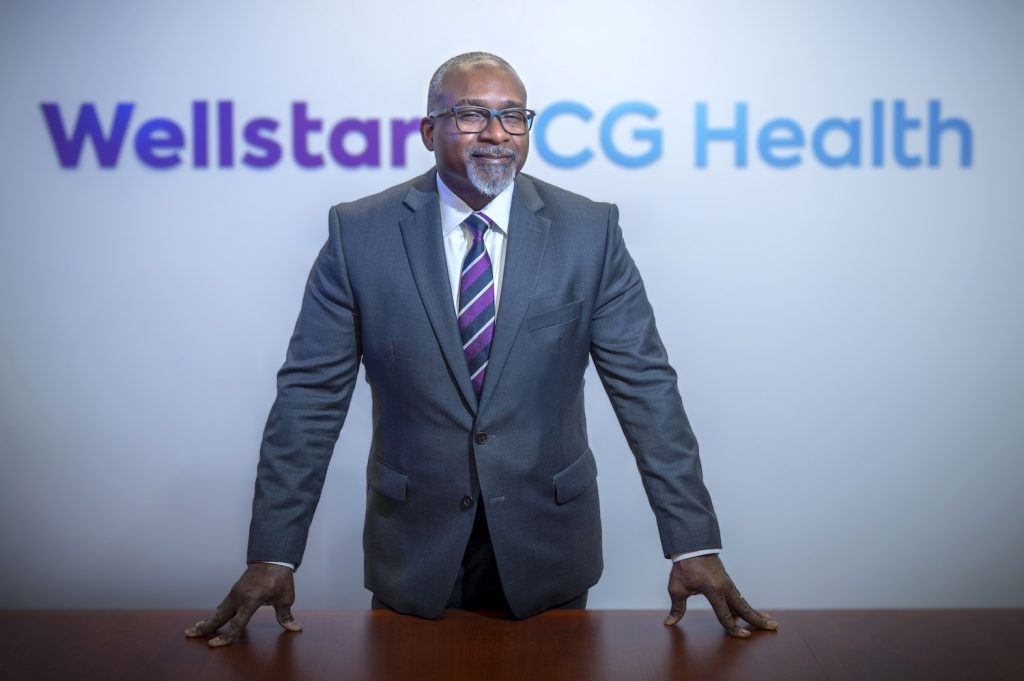
A foundry is a factory that produces metal castings, he explained.
“It was hot. And one day I was pulling iron and fire shot across my lap, which quickly turned my attention to the military,” Turner said, smiling. “I immediately enlisted, searching for something in health care because South Georgia Medical Center was in Valdosta. So, I figured I’d go in the military for four years, get out, go back to Valdosta State, and get a part-time job at South Georgia Medical Center with whatever training I received in the military.”
“I always had a knack for working with people. I always say, ‘I’m a leader first. My job just happens to be in health care.’”
Ralph D. Turner, DBA, president of Wellstar MCG Health Medical Center
When Turner joined the Army in 1986, it was at the end of the fiscal year, and most of the health care duties were already taken, he said.
“All the jobs were taken except for three: a veterinary food inspector, a veterinary assistant or a biomed engineering position fixing medical equipment,” Turner said. “Well, they showed me a film about the veterinary stuff, and the first film they turned on had a guy coming out of a little office into a clinic with a huge albino python snake wrapped around his neck. And I immediately said, ‘I will not be doing that.’”
“I became a biomedical equipment repairman by default,” Turner added, laughing. “Four years went by, and I saw myself liking the Army. I got promoted quickly. I always had a knack for working with people. I always say, ‘I’m a leader first. My job just happens to be in health care.’”
A nontraditional path to success
Turner spent 21 years in the military and retired in 2008 after being stationed at forts around the world including bases in Texas, Louisiana, Germany, Alaska, Washington, D.C., and Seoul, South Korea.
He met his wife Ann in Aurora, Colorado, at Fitzsimmons Army Medical Center. They have been married for 32 years and have two boys, Lorenz and Trevaun.
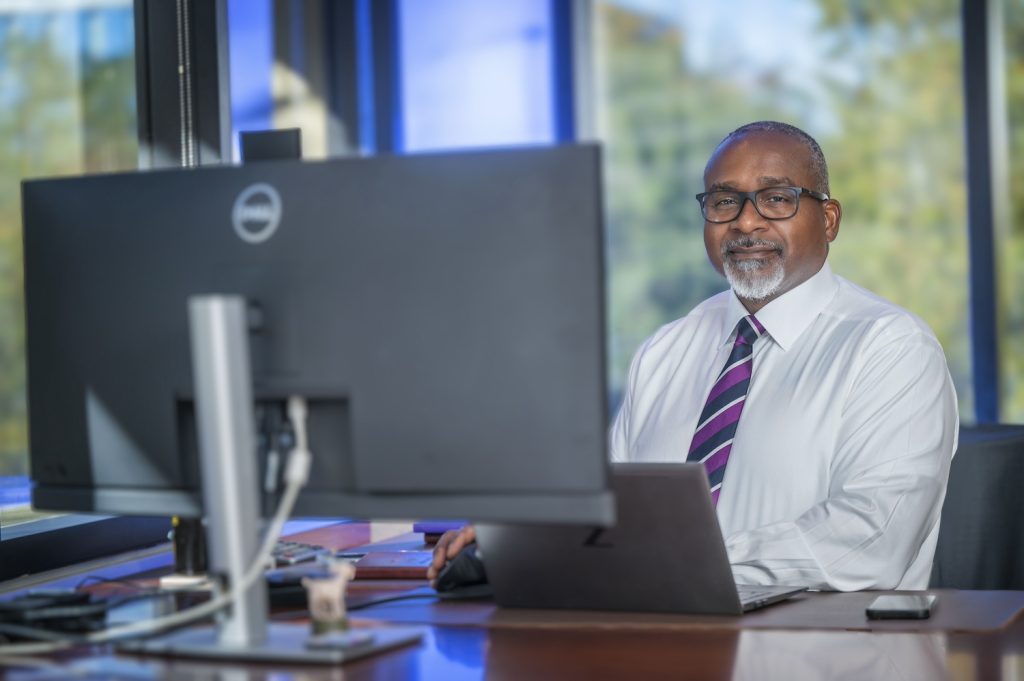
During his time in the Army, Turner was also constantly taking classes to further his education. He earned his bachelor’s degree in 1995 and went on to earn a master’s in public administration from Troy University-Dothan in 2002 and a master’s in health care administration from the University of Maryland in 2011.
“When you spend 37 years in a career doing something you enjoy, you get to love what you’re doing. And I love taking care of people.”
Ralph D. Turner, DBA, president of Wellstar MCG Health Medical Center
Since retiring from the military, Turner has held leadership roles at complex health care organizations across the country, including MedStar Washington Hospital Center, the University of Wisconsin Hospital and Clinics, the Indian River Medical Center in Vero Beach, Florida, and the Cleveland Clinic in Ohio. In 2018, Turner also received his doctorate in business administration from the University of Wisconsin-Whitewater.
Turner’s position with Wellstar began in May 2022 when he became president of Wellstar Paulding Medical Center in Hiram, Georgia. Today, he proudly serves as the first president of Wellstar MCG Health in Augusta.
“I’ll be the first to admit it hasn’t been easy. I knew where I wanted to go, so I just had to grit my teeth and keep trying to get there,” he said. “It’s sort of like my education. I’m not a traditional student. I didn’t graduate high school and go to college for four years. Every bit of education I received – my bachelor’s, two master’s and a doctorate – has always been while working full time. I’ve never just had an opportunity to go to school. So, nothing has been traditional for me.”
But you don’t have to be a traditional student to find success, Turner said.
“I always knew I really loved leading. And that’s what’s got me here: my love to lead,” he said. “And when you spend 37 years in a career doing something you enjoy, you get to love what you’re doing. And I love taking care of people.”
“Getting the opportunity to have someone come to you when they are in the most vulnerable state, and you get them back healthy – that’s my job satisfaction,” Turner added. “So, my best advice to recent college graduates: Figure out your why. The rest will fall into place.”
 Augusta University
Augusta University
